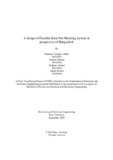| dc.contributor.advisor | Huda, A.S. Nazmul | |
| dc.contributor.advisor | Mohsin, Abu S. M. | |
| dc.contributor.author | Labiba, Sumaiya Tarique | |
| dc.contributor.author | Sultana, Tanjina | |
| dc.contributor.author | Ahmed, Iftekhar | |
| dc.contributor.author | Kundu, Ankita | |
| dc.date.accessioned | 2023-05-08T03:21:01Z | |
| dc.date.available | 2023-05-08T03:21:01Z | |
| dc.date.copyright | 2022 | |
| dc.date.issued | 2022-09 | |
| dc.identifier.other | ID 19121032 | |
| dc.identifier.other | ID 19121038 | |
| dc.identifier.other | ID 19121044 | |
| dc.identifier.other | ID 19121048 | |
| dc.identifier.uri | http://hdl.handle.net/10361/18230 | |
| dc.description | This design report is submitted in partial fulfillment of the requirements for the degree of Bachelor of Science in Electrical and Electronic Engineering, 2022. | en_US |
| dc.description | Cataloged from PDF version of design report. | |
| dc.description | Includes bibliographical references (pages 87-88). | |
| dc.description.abstract | With the increase in demand of energy and the scarcity of non-renewable resources; it has encouraged the modern world to find alternative ways of energy production and distribution as means of a solution. The approach of solar net metering is one of the most beneficial ways for countries possessing higher potential for solar energy, especially Bangladesh. Solar net metering has been introduced in few of the countries worldwide due to the system producing green energy alongside providing financial benefits to the consumers. With net metering, the consumers obtain credits on their electricity bill with respect to the "net" amount of energy used each month which is the difference between the amount of energy the solar generation system produces and the amount of energy consumed by houses during the billing period. The excess electricity formed by the solar system is sent back to the grid. There are different ways to implement solar net metering, it includes community net metering, aggregate net metering and virtual net metering, each containing different beneficiaries for particular consumer categories. | en_US |
| dc.description.statementofresponsibility | Sumaiya Tarique Labiba | |
| dc.description.statementofresponsibility | Tanjina Sultana | |
| dc.description.statementofresponsibility | Iftekhar Ahmed | |
| dc.description.statementofresponsibility | Ankita Kundu | |
| dc.format.extent | 103 pages | |
| dc.language.iso | en | en_US |
| dc.publisher | Brac University | en_US |
| dc.rights | Brac University design reports are protected by copyright. They may be viewed from this source for any purpose, but reproduction or distribution in any format is prohibited without written permission. | |
| dc.subject | Solar net | en_US |
| dc.subject | Solar energy | en_US |
| dc.subject | Net metering | en_US |
| dc.subject | Photovoltaic | en_US |
| dc.subject.lcsh | Solar energy--Economic aspects | |
| dc.subject.lcsh | Electric utilities | |
| dc.title | A design of feasible solar net metering system in perspective of Bangladesh | en_US |
| dc.type | Design report | en_US |
| dc.contributor.department | Department of Electrical and Electronic Engineering, Brac University | |
| dc.description.degree | B. Electrical and Electronic Engineering | |

